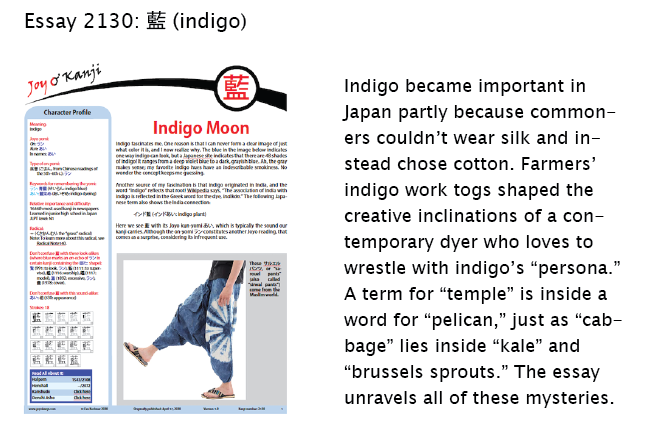Cabbages and Kids
I started 2020 with Radical Note 39 on 子 as a tie-in with the Year of the Rat (子), never imagining of course that that zodiacal Rat would bring us a Plague with a capital P.
Artists come at the world from a different perspective, and painter Ellie Fidler is still able to focus on this animal's assets: "The rat is a survivor, a clever, creative problem solver who can find his way out of the maze and into the light."
Impressive as that viewpoint is, I can't seem to muster up her enthusiasm. Today, of all days, my dogs excavated a severely decomposed rat and took turns licking it and rolling on it. The rat's horrifyingly long tail was still quite intact and oddly segmented like that of an opossum, the whole assembly the stuff of nightmares.
I can at least feel good about the kanji version of 子, which I glimpsed in a new way while working on the essay on 藍 (indigo). I spent awhile pondering this word:
子持ち甘藍 (こもちかんらん: brussels sprouts) child + having + cabbage (last 2 kanji)
Both halves are unexpected. The 甘藍 part can function as an autonomous term:
甘藍 (かんらん: cabbage) sweet + indigo
This green vegetable has no connection to indigo—or to sweetness, come to think of it. The term 甘藍 came from Chinese and is brand-new to my proofreader; the Japanese normally use キャベツ.
As for the 子持ち, which literally means "having children," that's particularly odd. My proofreader theorized that this vegetable could be called that because the stalk bears many round fruits that resemble babies.
In confusion I asked, "Do the Japanese think of human babies as round balls?!"
Amused, he said, "No, no. Babies are just babies, not balls!"
Just to be sure, I asked this: "Are we talking about human babies?"
He replied, "Figuratively 子 can refer to human babies or other animals, including a fish with roe in it, and even to inanimate objects."
By way of example, he mentioned a popular fish called 子持ちししゃも, where ししゃも means "smelt" and 子持ち (こもち) refers to the roe in its belly. He also cited 子持ち昆布 (こもちこんぶ: kombu kelp covered with fish eggs), where 子 represents the eggs.
As an example from the inanimate world, he touched on this kind of pattern:
子持ち縞 (こもちじま: pattern with alternating thicker and thinner stripes)
The thicker stripes are the “parents,” the thinner ones their “children.”
Understanding that the Japanese sometimes use 子 for the young of any species, for the eggs of some animals, or for baby versions of bigger things, I returned to this term:
子持ち甘藍 (こもちかんらん: brussels sprouts) child + having + cabbage (last 2 kanji)
I never realized it but brussels sprouts (which are the round buds of a plant) resemble little cabbages!
Incidentally, no one would write the term for "brussels sprouts" that way. It's usually rendered as follows:
芽キャベツ (めキャベツ or メキャベツ: brussels sprouts)
The 芽 means "sprout," so this term again recognizes the cabbage connection that has eluded me until now.
Given all this, how can we understand the following derogatory, jokey term:
子持ち様 (こもちさま: arrogant or inconsiderate parent)
having children (1st 2 kanji) + honorific title
Because 子持ち means “having a child,” it can quite logically refer to a parent. Meanwhile, the honorific title -様 is sarcastic here, implying that the parent in question acts superior to those who have no kids, precisely because he or she has a child.
Then what do we make of this term:
子音 (しいん: consonant) child + sound
What's childish about a consonant?
This term goes hand in hand with another, giving the child a mother, so to speak:
母音 (ぼいん: vowel) mother + sound
Dictionaries don’t provide the etymologies for these two terms, but my proofreader guesses that a vowel is more important in a syllable than a consonant in Japanese.
I'll leave you with a sneak preview of essay 2130 on 藍, which I found to be one of the most exciting essays I've written in some time, probably because I included beautiful art and fascinating explanations from three accomplished indigo dyers:
Catch you back here next time!
❖❖❖
Did you like this post? Express your love by supporting Joy o' Kanji on Patreon:



Comments